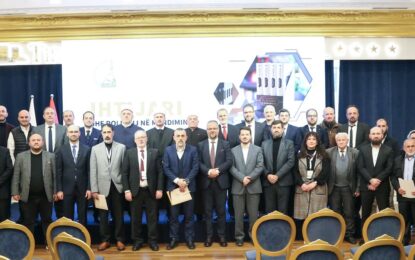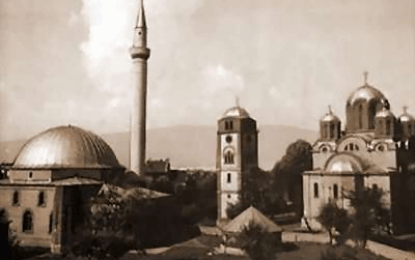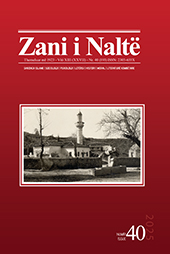Perditësimi i fundit February 26th, 2026 12:14 PM
Te fundit
- PAMJE MAHNITËSE E QELIZËS (QELIZA-SHKENCA DHE KURANI)
- Recension për librin: “Me Zotin mes njerëzve” me autor z. Dorian Demetja
- Zhvillohet konferenca shekncore “Ihtijari dhe roli i tij në mendimin juridik islam”
- Për çfarë shërbejnë universitetet?
- Kushtetuta e vitit 1925 dhe ndikimi i saj në zhvillimet politike dhe juridike në Shqipëri
Abstracts no. 39
Jun 25, 2025 Zani i Nalte English 0
Studies
1. Islamic Periodicals in Albania During World War II – The Journal “Kultura Islame”
MSc. Dorian Demetja, Director of the Directorate of Culture, Albanian Muslim Community.
Abstract
Albanian Islamic periodicals began to take shape in the early 20th century, developing alongside the country’s path to independence. Their role became more defined with the establishment of the Albanian Muslim Community. However, the outbreak of World War II brought an abrupt halt to “Zani i Naltë”, the official publication of the Muslim Community, leaving a significant gap in religious and patriotic education—both of which were crucial at the time.
To fill this void, the Muslim Community of Albania launched “Kultura Islame”, a journal that was published from September 1939 to February 1946. Initially, it served as a monthly publication covering religious, philosophical, literary, moral, and social topics. Over time, its scope expanded to include religious, literary, scientific, and artistic themes, reflecting the evolving intellectual and cultural needs of its readers.
2. The Approach of Classical and Modern Scholars Regarding “Al-Ḥurūf al-Muqattaʿa” – The Disjointed Letters
Armand Asllani – Editor-in-Chief of the journal “Zani i Naltë”, Albanian Muslim Community.
Abstract
This paper delves into one of the most intriguing and debated topics in Qur’anic studies: Al-Ḥurūf al-Muqattaʿa, or the Disjointed Letters, which appear at the beginning of 29 surahs in the Holy Qur’an. These unique letters, pronounced individually rather than forming complete words, have sparked curiosity and debate among scholars since the earliest days of Islamic thought. Some believe that their true meaning is known only to Allah, while others argue that they carry specific messages that can be interpreted.
Throughout history, scholars—both classical and modern—have proposed various explanations. Some view these letters as symbols of divine miracles, evidence of the Qur’an’s inimitability, or signs of the prophethood of Muhammad (peace be upon him). Others suggest that they serve as attention-grabbing devices, divine oaths, or even teaching tools for introducing the Arabic alphabet.
This paper explores these diverse perspectives by examining interpretations found in Qur’anic exegesis (tafsir) and contemporary Islamic literature. While the exact meaning of Al-Ḥurūf al-Muqattaʿa remains a mystery, their presence in the Qur’an continues to inspire curiosity and scholarly exploration, leaving open the possibility of deeper understanding in the future.
Keywords: Al-Ḥurūf al-Muqattaʿa, Qur’an, classical scholars, modern scholars, Qur’anic miracle.
Islamic Sciences
3. The Creation of Adam and Hawwa According to Imam Maturidi
Dr. Osman Nuri Demir
Abstract
This article explores Imam Maturidi’s perspective on the creation of Adam and Hawwa, shedding light on one of the most significant theological discussions in Islam. Drawing from his interpretations of Qur’anic verses, Maturidi presents a rational and systematic approach to understanding human creation.
According to Maturidi, Adam was both the first human and the first prophet, created from pure and carefully chosen earth that underwent various stages of preparation. He emphasizes that the essence of human creation is unique and perfectly suited to human nature, firmly rejecting any notion that it could be impure or unworthy.
Maturidi also argues that both Adam and Hawwa originate from the same source, which he refers to as nafs-i wahida (“a single soul/self”). He stresses that all humans share this common origin, and there is no inherent superiority between men and women in terms of their creation. While Hawwa is acknowledged as the first woman, Maturidi does not support the widely held belief that she was created from Adam’s rib. Instead, he relies strictly on Qur’anic verses and authentic hadiths, distancing himself from speculative narratives.
What stands out in Maturidi’s approach is his emphasis on reason and symbolism. He interprets both the physical and spiritual aspects of human creation in a way that highlights deeper meanings rather than focusing solely on literal interpretations. Most importantly, he underscores that human superiority is not determined by the manner of creation but by one’s actions and moral integrity.
In the end, Maturidi’s analysis offers a profound and inclusive perspective on human nature—one that rejects gender-based superiority and instead focuses on equality, responsibility, and moral excellence as the true measures of distinction.
Keywords: Imam Maturidi, creation of Adam, creation of Hawwa, nafs-i wahida, Islamic theology, gender equality, Qur’an, tafsir.
History
4. The Arabs Before Islam
Prof. Dr. Qazim Qazimi
Abstract
This article explores the lives of the Arabs before the arrival of Islam, shedding light on their geographical environment, religious beliefs, cultural practices, education, and social structure. The Arabian Peninsula, a vast desert region with a strategic trade position, was home to a mostly nomadic population that lacked political unity. Society was organized into patriarchal tribes and clans, where loyalty to one’s kin was paramount. Social divisions were stark—nobles held power and prestige, while slaves formed the lowest and most marginalized class. The economy revolved around livestock herding and trade, particularly through the caravan routes that connected Arabia to powerful civilizations like Byzantium, Persia, and India.
Culturally, poetry held a central place, serving as a means of storytelling, preserving history, and expressing personal and tribal honor. However, formal education and political institutions were largely underdeveloped. In terms of faith, the Arabs had transitioned from the monotheism of Abraham (peace be upon him) to widespread polytheism, with idol worship being deeply rooted, especially in Mecca. At the same time, Jewish and Christian communities were present in some regions, though they remained a minority.
Arab social traditions placed great emphasis on hospitality, loyalty, and honor, but also included harsh customs, such as the practice of burying infant girls alive due to social and economic pressures. Politically, small Arab principalities such as those in Yemen, Palmyra (Tadmur), and Petra held some influence but were often under the control of larger empires like Byzantium and Persia.
Despite their fragmented and largely unstructured way of life, the arrival of Islam and the revelation of the Qur’an brought a transformation that would unify the Arab people and lay the foundations for one of history’s greatest civilizations.
Keywords: Pre-Islamic Arabs, Jahiliyyah, Arabian Peninsula, tribal society, polytheism, trade, poetry, cultural transformation.
Morality
5. Spiritual Ethics and Moral Principles According to Imam Al-Ghazali
Prof. Dr. Hajredin Hoxha
This study explores Imam Al-Ghazali’s profound insights into the spiritual and moral dimensions of reading and understanding the Qur’an. Al-Ghazali believed that reciting the Qur’an should not be a mere ritual but a deeply transformative experience that nurtures both the heart and soul. To help believers develop a sincere and meaningful connection with the Word of Allah, he outlined ten key principles.
These principles emphasize the importance of recognizing the greatness of divine speech, approaching the Qur’an with humility and devotion, engaging in deep contemplation, and removing distractions that hinder understanding. Al-Ghazali encouraged readers to internalize the message of the Qur’an, seeing every verse as a personal communication from Allah, meant to inspire reflection and ethical growth.
According to him, true recitation is not just about pronouncing words but about aligning the tongue, mind, and heart in a way that leads to spiritual elevation and moral refinement. The Qur’an, he argued, should shape one’s character, guiding believers toward humility, sincerity, and righteousness.
This article highlights the spiritual depth of Qur’anic recitation, presenting it as a lifelong journey of self-improvement and inner peace. Through Al-Ghazali’s wisdom, we are reminded that the Qur’an is not just a book to be read—it is a divine conversation meant to transform our hearts and actions.
Philosophy
6. Konak with Edison
Nuredin Nazarko
Abstract
“Konak with Edison” is a profound and poetic meditation on the human experience, exploring the mysteries of existence through the lens of philosophy, art, and poetry. It delves into life’s deepest questions: What is our true purpose? Is life merely a cycle of biological functions, or does it hold a greater meaning? How can we live authentically when so much of our existence seems dictated by predetermined roles and expectations?
The author challenges the idea of living within rigid structures, where every action serves a fixed purpose leading to a predetermined result. Such a life, he argues, is not truly lived but merely performed—like an experiment in a laboratory where human curiosity, struggle, and self-discovery are stripped away. When we prioritize function over meaning, we risk losing the beauty and mysticism that make life worth living.
“Konak with Edison” seeks to walk the winding paths where life’s mysteries reveal themselves, embracing the dilemmas that make us truly human. These challenges should not be avoided or ignored—they must be experienced fully. Only by engaging with the uncertainty and depth of life can we find true fulfillment.
Written in a language rich with metaphor and symbolism, “Konak with Edison” is an invitation to live with awareness, to protect personal freedom, and to seek a life of depth and meaning beyond the surface of everyday existence. The questions it raises are timeless, offering a thought-provoking journey for anyone seeking to understand themselves and the world around them.
Keywords: freedom, purpose, memory, love, art, poetry.
Personality
7. Hasan Ef. Nahi – Translator of the Noble Qur’an
Resul ef. Rexhepi
Abstract
This article sheds light on the life and legacy of Hasan Efendi Nahi, a remarkable Islamic scholar whose dedication to faith and education left a lasting impact on Albanian-speaking Muslims. He is best known for completing the first full translation of the Noble Qur’an into Albanian, titled “Kur’ani i Madhëruar”.
Born in 1905 in Gjakova, Hasan Ef. Nahi devoted his life to religious scholarship and education. His journey took him to the prestigious Al-Azhar University in Egypt, where he deepened his understanding of Tafsir (Qur’anic exegesis), Arabic grammar, and Islamic jurisprudence (Fiqh). Despite facing political and social challenges, he remained committed to making the message of the Qur’an accessible to Albanians.
His translation, published in 1988, was not just a linguistic achievement but also a spiritual mission. He carefully selected words to preserve the depth and beauty of the Qur’an’s message while ensuring clarity for Albanian readers. Unlike literal translations that risk distorting meaning, Hasan Ef. Nahi’s approach sought to capture the essence of the Qur’anic text while maintaining its sacred integrity.
His work stands as a monumental contribution to Albanian religious and cultural heritage, shaping generations of believers and enriching Islamic literature in the Albanian language. Through his dedication, he not only brought the words of the Qur’an closer to his people but also strengthened their spiritual and intellectual connection to their faith.
Keywords: Hasan Ef. Nahi, Qur’an, translation, Albanian language, Tafsir, Al-Azhar, Islamic education, Albanian heritage.
Recension
8. Review of the Book: “The Bujan Conference: A Cornerstone of Kosovo’s Statehood”, Author: Alban Dobruna
Reviewer: Prof. Assoc. Dr. Ilirjana Kaceli
Abstract
This review explores the book “The Bujan Conference: A Cornerstone of Kosovo’s Statehood (December 31, 1943 – January 1-2, 1944)”, written by Assoc. Prof. Dr. Alban Dobruna. The book delves into one of the most significant moments in Kosovo’s history and the Albanian liberation movement during World War II. The Bujan Conference, held during a crucial historical period, marked the formation of the National Liberation Council for Kosovo and the Dukagjin Plain and led to the adoption of the Bujan Resolution—a groundbreaking document that, for the first time, asserted Kosovo Albanians’ right to self-determination and their aspiration to unite with Albania.
The book thoughtfully examines key themes, structured into four chapters: the education and political formation of Albanian cadres, the organization of the anti-fascist resistance, the decisions made at the Bujan Conference, and the reaction of both the Albanian and Yugoslav communist parties. Dobruna also analyzes how the conference’s resolutions influenced post-war political developments and their lasting impact on Kosovo’s long struggle for independence, culminating in 2008.
The author highlights the historical and political significance of the Bujan Conference, describing it as the first official act advocating for Kosovo’s self-determination. Through a detailed historical analysis, the book provides valuable insights into the long-term political and social consequences of the conference’s decisions. It serves as an essential resource for scholars, historians, and readers interested in the history of Kosovo and the broader Albanian political landscape.
Keywords: Bujan Conference, anti-fascist resistance, self-determination, Kosovo history, Bujan Resolution, Albanian politics.
9. Review of the Book: “Bardhësitë e Atdheut” (The Purities of the Homeland) Author: Afrim Mustafa
Reviewer: Prof. Dr. Mehmet Halimi
Abstract
The Importance and Legacy of the Book “Bardhësitë e Atdheut” by Afrim Mustafa
This review explores the significance of Afrim Mustafa’s book, “Bardhësitë e Atdheut” (The Purities of the Homeland), a powerful and deeply meaningful work that stands as a historical and cultural testament to the Albanian nation. Through detailed research and compelling storytelling, Mustafa provides a comprehensive account of the struggles and sacrifices made by the three Albanian military forces: the Kosovo Liberation Army (UÇK), the National Liberation Army (UÇK) in North Macedonia, and the Liberation Army of Preševo, Medveđa, and Bujanovac (UÇPMB).
More than just a historical record, the book serves as a tribute to the resilience, courage, and unity of the Albanian people. Built on verified facts, eyewitness testimonies, and historical documents, it immortalizes key events and heroic figures who played a vital role in the fight for freedom and national unity.
One of the book’s greatest strengths is Mustafa’s rich and eloquent writing style, which skillfully blends historical accuracy with a deeply emotional and engaging narrative. His ability to present history with both precision and passion transforms this work into an invaluable contribution to Albanian historiography.
At its core, “Bardhësitë e Atdheut” is a reminder that national freedom is not just won through battles, but also through intellectual and cultural commitment. It stands as a source of inspiration and a timeless testament to Albanian history and sacrifice, ensuring that future generations remain connected to their past and motivated to preserve their heritage.
Keywords: National history, Afrim Mustafa, liberation wars, national unity, Albanian historiography.
Retrospective
10. The Role of Women in Islam
Abstract
This article explores the role and status of women in Islam, focusing on the teachings of the Qur’an and the transformative influence of Prophet Muhammad (peace be upon him) in improving women’s position in society. Islam brought a profound shift in how women were viewed and treated, elevating their dignity, rights, and status both spiritually and socially. The Qur’an highlights the importance of kindness and respect toward women, particularly through the concepts of “erhám” (mercy and family bonds) and “taqwa” (piety and mindfulness of God), reinforcing their sacred role, especially as mothers.
The article also examines the positive changes Islam introduced to women’s lives, improving their status as daughters, wives, and mothers. One of Islam’s key principles is justice and protection for women, ensuring their right to own property, economic independence, and social dignity. Islam played a crucial role in abolishing harmful pre-Islamic customs, such as female infanticide and the treatment of women as mere property or commodities.
Prophet Muhammad (peace be upon him), despite experiencing the loss of both parents as a child, strongly emphasized the importance of honoring and respecting women and parents. His teachings laid the foundation for a society in which women were recognized, protected, and valued.
The article concludes by emphasizing Islam’s enduring role in promoting morality and gender justice. Through the principles of Sharia, Islam continues to safeguard the dignity, rights, and respect of women, ensuring their rightful place in both family and society.
Keywords: Islam, women, Qur’an, Prophet Muhammad (peace be upon him), women’s rights, gender justice, Sharia.
Artikuj të ngjashëm
-
 PAMJE MAHNITËSE E QELIZËS...
PAMJE MAHNITËSE E QELIZËS...Feb 26, 2026 0
-
 Recension për librin: “Me Zotin mes...
Recension për librin: “Me Zotin mes...Feb 09, 2026 0
-
 Zhvillohet konferenca shekncore...
Zhvillohet konferenca shekncore...Jan 15, 2026 0
-
 Për çfarë shërbejnë universitetet?
Për çfarë shërbejnë universitetet?Oct 09, 2025 0
Me shumë në këtë kategori
-
 Abstracts no. 40
Abstracts no. 40Sep 04, 2025 0
-
 Abstracts no. 38
Abstracts no. 38Jul 02, 2024 0
-
 Abstracts no. 37
Abstracts no. 37May 07, 2024 0
-
 Abstracts no. 36
Abstracts no. 36Feb 12, 2024 0
Aktivitete
Jan 15, 2026 0
Kjo konferencë u organizua në ambientet e “Tirana International Hotel”, me rastin e botimit të kolanës “El-Ihtijaru li Ta’lili-l-Muhtari”, botim ky i cili vjen si bashkëpunim...Studime
May 21, 2025 0
Abstrakt Ky punim trajton një nga temat më komplekse dhe të diskutueshme në studimet e Kur’anit: “El-Huruf el-Mukatta’a” (shkronjat e ndërprera) që shfaqen në fillim të 29...Gjuhë-letërsi
May 21, 2025 0
Nuredin Nazarko Abstrakt “Konak me Edisonin” është një reflektim filozofik-letrar që eksploron përmasat ekzistenciale të jetës njerëzore përmes një udhëtimi meditativ...Sociologji
Sep 04, 2025 0
Dr. Feim Hoxha ABSTRAKTI Sociologjia, si një nga shkencat më të rëndësishme humane, ka në fokus të studimeve të saj njeriun si një qenie sociale, si dhe shoqërinë në të cilën...




















